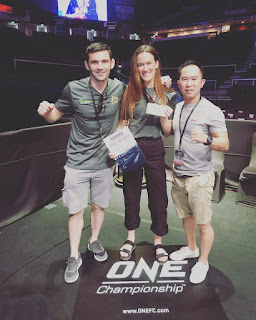Be Consistent - Forget about 'Fight Camps'.
Train consistently at the same classes and sessions every week. Don't train hard for a few months and then drop-off for weeks at a time. Early in your career, you need to be ready to fight all the time, often at short notice. If you arent staying ready you'll miss out on good opportunities which could be the difference between reaching your goals or going nowhere. If you keep taking time off then needing to do intense training camps, it will cause injuries, lack of technical improvement and you won't reach your full potential.
As a coach, one of the worst things a fighter can do is to train hard in the lead up to a fight and then quit training straight afterwards. This is even worse when the fighters teammates also have upcoming fights to prepare for. It is very unlikely the coach will be prepared to put the same effort into training the fighter in the future if he knows they lack commitment. Another side of this is to not chop and change your training every couple of weeks, stick with what has been getting you results and gradually increase the volume and intensity of your training.
Train Smart but be prepared to Train through Injuries.
Avoid unsafe training environments. These are usually found in tough-guy gyms where every session is 100% sparring with nobody actually learning anything or improving. If you have an experienced coach and a good team they will be able to supervise and plan your training and workload in such a way that you don't get injured. However, the reality is that MMA is a tough contact sport. You will pick up bumps, bruises and minor injuries along away the way no matter how careful you are. If you need to take three weeks off training every time you have a sore elbow you will never reach the top.
At the elite levels of any sport, every player is playing injured all the time. Get used to it, strap up your injured knee, elbow or foot and keep going. Select different exercises or techniques that won't exacerbate the injury but avoid taking time off at all costs. If training consistently to achieve your goals is important to you you will find a way to make it happen, if it's not important you will find an excuse.
Don't give up your Day Job.
Do not try to become a full-time fighter until you have a winning record in a major MMA organisation. You will need money for training fees, competition fees and other expenses. You should be prepared to fight for free for at least the first few years of your fight career so you will need an additional income to support yourself. Beware of fight offers with promises of attractive fight purses early in your career. Chances are you are being set up to lose against a more experienced local fighter.
The amount of extra training you'll get done by not working will usually end up not being worth it. Most gyms and martial arts schools do most of their training outside of work hours. Even if you quit your job in order to train full time most of your training partners will be at work.
Find legitimate Coaches and a Team you can trust and stick to their advice.
Find experienced and trustworthy coaches, follow their advice and stick with them. Lots of experts will appear out of the woodwork and start offering advice once you achieve some success, but be careful who you listen to and take advice from. Beware of people offering to help out for free, usually, there is still going to be a price to pay, As a coach you are more likely to want to help and focus on the fighters who have been with you form the beginning and who feel part of the team rather than outsiders,
Forget about building your Social Media Profile.
The amount of time and effort that people spend on this will be much better spent on working on developing your fighting skills. Let your fight results speak for themselves and then the opportunities and sponsorships will follow. There's no point building your social media following and then getting a chance to fight on a big event like the UFC if you actually aren't yet ready for it because you haven't put the time and effort into your training.
Forget about lucrative Sponsorship Deals.
MMA is a relatively inexpensive sport compared to some others, the only expense is gym fees, occasional competition fees, training equipment which usually lasts a long time and some supplements. Being a sponsored athlete is usually good for the fighters ego but in general its not usually beneficial or necessary to their long term career.
Get Experience.
Jumping into professional level fights too soon without adequate amateur experience is a recipe for disaster. Get as much experience as you can especially early in your career, Amateur fights are necessary to develop and build up your skills and experience. It's important not to fight above your level too soon as a bad loss may be very demoralizing and affect your future training and performance in fights. Fix the holes in your game before you reach the bigger stages. An MMA fighter needs to be skilled in the areas of striking, takedowns and groundwork and be able to combine them.
Focusing on only one area at the expense of other skills will leave holes in your game which will be easily exploited by more experienced future opponents. Competing in other combat sports such as BJJ or amateur Kickboxing is a good safe way to gain valuable experience and develop your skills so that you are more well rounded and more of a threat when you fight in MMA.
Check out our MMA Classes at DKMMA Melbourne













